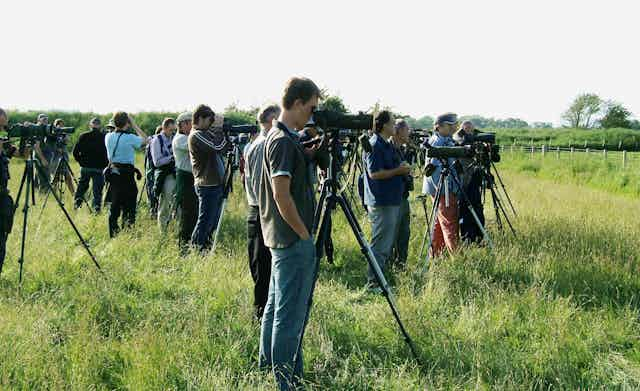My Rare Bird Alert pager bleeped insistently at precisely 2.05pm on Saturday April 29. I read the message with some disbelief: there was a female red-winged blackbird Agelaius phoeniceus at Garso, North Ronaldsay, the most remote island in Orkney. Across Britain the same mega (very rare bird) alert was shouting away at around 3,000 other folk with pagers.
By that Saturday night I had taken numerous phone calls from excited birding pals, and even been offered a seat on a charter flight in the coming days. But I had a pile of essays to mark to a deadline and it was out of the question. Fifteen charter planes landed on the island over the next three days, carrying birders/twitchers (the terms are more or less interchangeable) from London, Bristol, Lancashire, and my county of work, Nottinghamshire. Why was this bird so important that some birders were willing to pay upwards of £600 to get it on their British list?
First, rarity is both potent and alluring. This is the first ever red-winged blackbird to turn up in Britain, Ireland and the wider Western Palearctic, which includes Europe and northern Africa and Asia.
Second, we as birders are fascinated by the mysteries of migration. There is a sense of wonder as we muse on how this bird, a very common species in North America, made it all the way across the Atlantic to end up in Orkney. Was it whipped over by a fast-moving Atlantic depression? Did it hitch a ride on a ship? Did it land somewhere else, then relocate, and finally get found on North Ronaldsay which has a bird observatory? We will never know, but we can marvel and ponder as we adventure to see it. Birders have a unique and intimate geographical perspective of Britain.
Third, to get this bird on your list secures your current position in the UK400Club or British Ornithologists Union list rankings. (Birding like boxing, has competing authorities). If your rivals (like me) don’t go, you nudge one ahead, and they may never get it back on you. That gives bragging rights. There is an appeal in that. Competition and status are at the heart of many a hobby, however egalitarian it is, be it birding, dog showing or pigeon racing. But so, importantly, are excitement, friendship and tribal community. We are kindred spirits.

This particular red-winged blackbird is doomed. It has no functioning ecological value anymore, because it is so lost it will never find its way back to where the rest of its species lives in North America. It is much the same for many rare birds that turn up in Britain every spring and autumn.
Birders are in effect driving thousands of miles to watch disorientated, dysfunctional and displaced individuals that will never reconnect with the rest of their species. There is a pathos in that. To be brutal, the only true value that this red-winged blackbird now has is a financial one. Charter plane pilots, accommodation providers in Orkney, ferry companies and North Ronaldsay Bird Observatory can generate valuable income from the presence of this bird.
Of course, for those British birders who have ventured far to see it, it has an enduring cultural value beyond comprehension. The finder, Simon Davies, now basks in a sort of birding immortality, his name forever associated with a Yankee blackbird and whispered reverently at future twitches.
Broken rule
When I got my RBA pager back in 1997 as a reward to myself for finishing my PhD at St Andrews, I confidently proclaimed that it was never going to rule my life. I have been on a slippery slope since. It is attached to my torso, like an ornithological life-affirming pacemaker. Indeed, my heart often does beat in synch with it. It calls to me like a seductive siren, and I either respond, or try to ignore it during the working day.
Before you think that this is insanity, a life controlled by a small grey battery-operated box, it is worth noting that I am only a Championship twitcher (say, the Bolton Wanderers of birding). The hardcore up in the Premier League, with lists bigger than mine, essentially prosper or fail by messages on their pager at certain times of the year.
Some of them are unable to work full-time or hold down relationships. Others can find a balance. Ultimately, personal choices and sacrifices dictate that. Back in the 1990s, a pager was cutting edge technology. Who carries a pager now? NHS staff, politicians, and British birders it seems.
As I write this, the red-winged blackbird is still on North Ronaldsay, and I’m still marking 250 ecotourism essays. Feel my pain.

